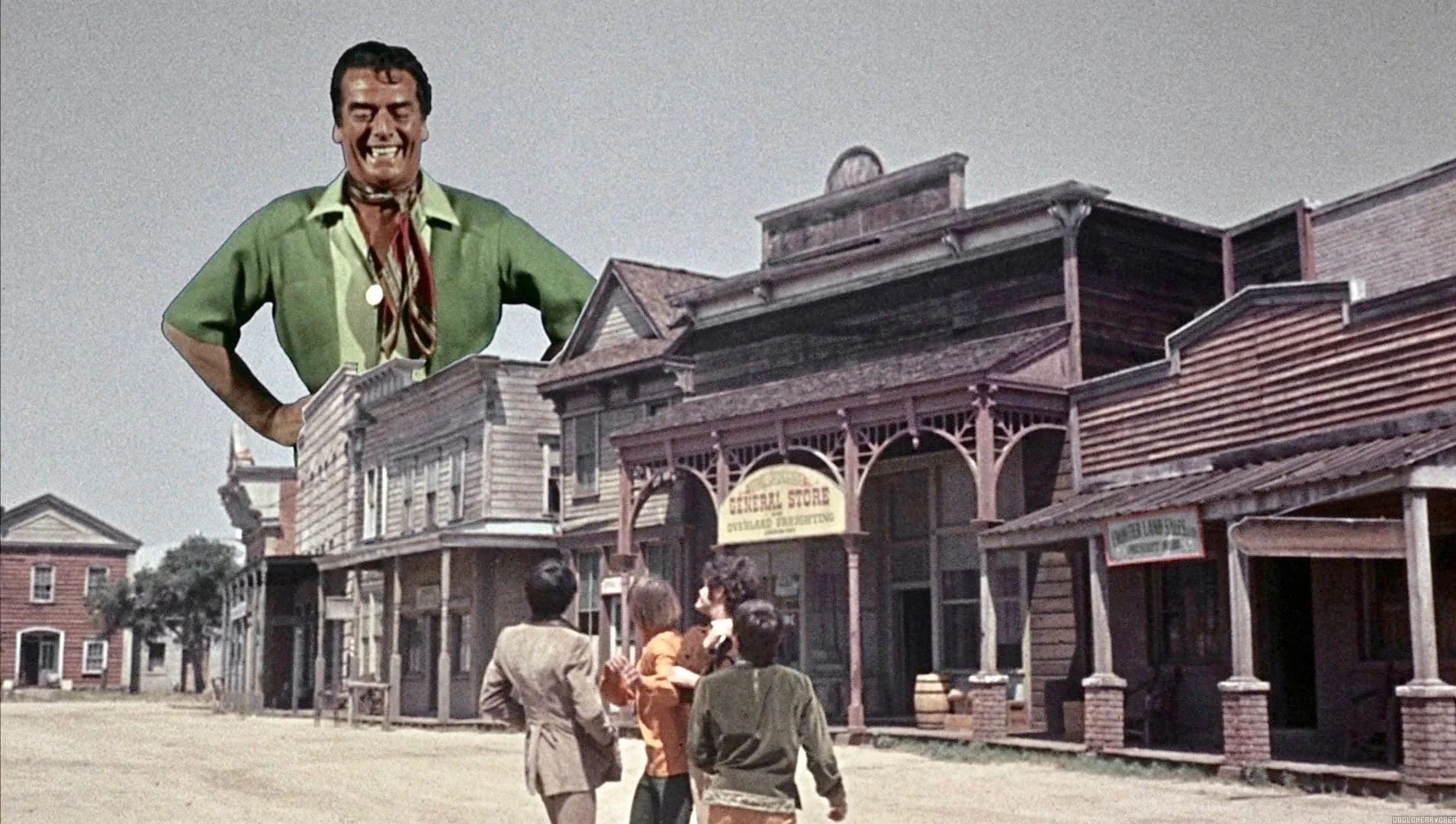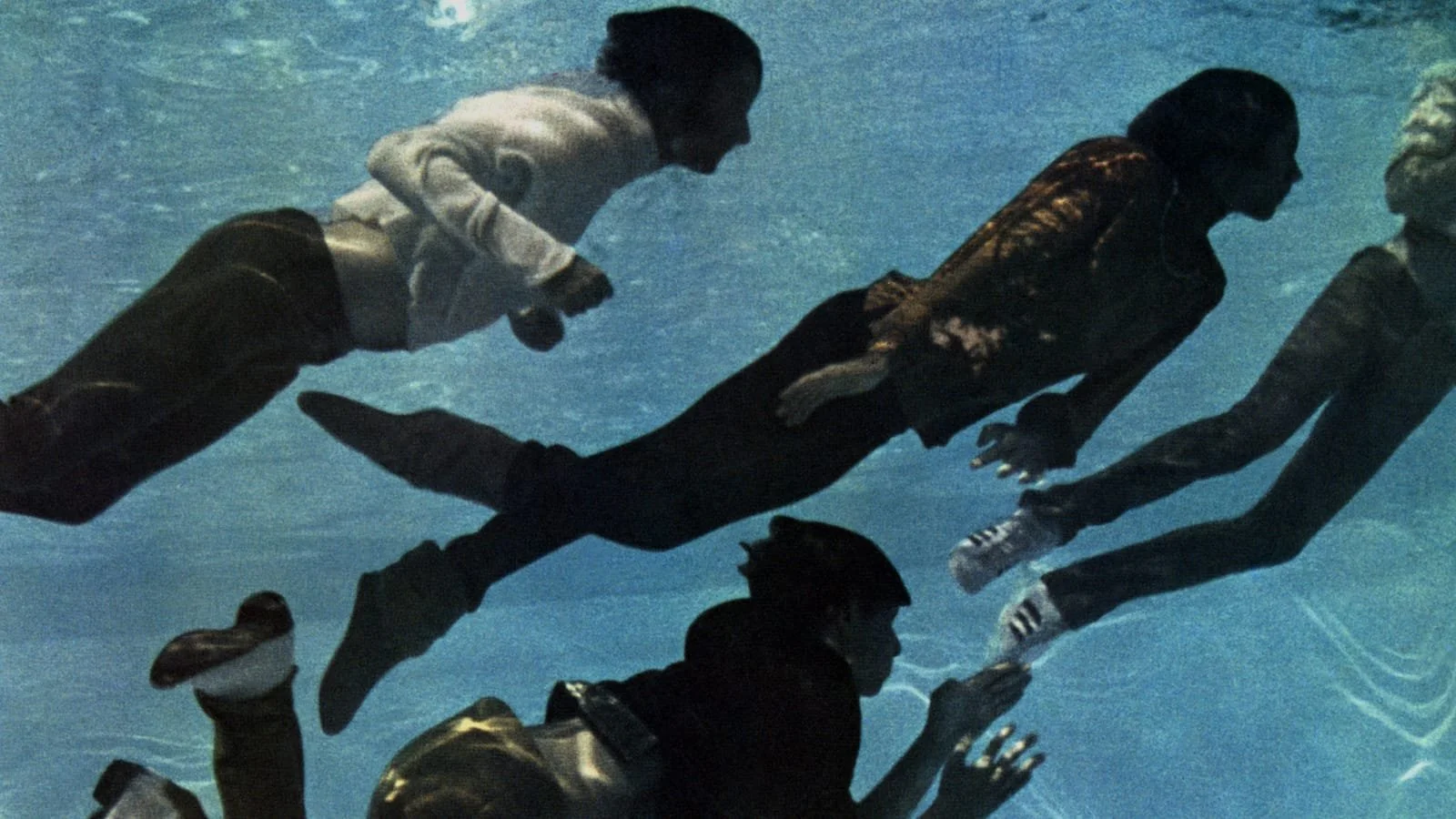In 1969, The Monkees and Jack Nicholson Gave us Head
This screening was part of the Alamo Drafthouse’s Weird Wednesday series. For upcoming shows, click here.
Hey hey we are The Monkees, you know we love to please, a manufactured image, with no philosophies. We hope you’ll like our story, although there isn’t one. That is to say there’s many, that way there is more fun. You’ve told us you like action, and games of many kinds, you like to dance, we like to sing, so let’s all lose our minds…
There’s Josie and The Pussycats, and there’s Head. Both satirical films tackle the commercialism pervading the music industry and its attempts to not only sell a band, but a product—and by extension, an American ideal. Except Head (1969) is about a “real” band, even if it was made by studio executives and the members originally auditioned for their slot on a television show. The Monkees remain the closest thing we’ve got to a ‘60s comic book band come to life, but unlike the fictional The Pussycats, held real contentions about being a plastic pop creation.
With manufactured personas and even more meticulously crafted music, The Monkees hit the scene with a record contract, TV platform and, as a result, a built-in fanbase. With all of this, members Davy Jones, Peter Tork, Mickey Dolenz, and Michael Nesmith would outsell The Beatles and The Rolling Stones. The Monkees television show ran for three seasons, becoming the epitome of inoffensiveness in rock and roll.
Once the show ended in 1968, The Monkees had other ideas for the band, namely a feature film. Head, written by Jack Nicholson and directed by Bob Rafelson (Five Easy Pieces), was The Monkees’ final piece in a long-running coup d'etat to attain full control of the band’s image, and gutted the currently existing image of the child-friendly band. The result is a cult anti-war and anti-commercialism relic, which quickly dismantled any ideas the band’s members had about their music and their prefab image. Even the promotion for the film subverted commercial expectations, with no mention of The Monkees in materials for Head, and the only ad making a play off of Andy Warhol’s short film “Blow Job.”
Within the first 15 minutes of Head, we witness Dolenz throw himself from the Golden Gate Bridge, a young woman test each members’ kissing skills, and the infamous clip of Nguyễn Văn Lém’s execution in Saigon (maybe the only film with a G-rating to do so). It’s scathingly anti-war, grappling with the horrors of the ongoing Vietnam War. While young men were sent across the world to fight in an unjustifiable war, their peers The Monkees were on stage, singing “Circle Sky” for a raucous crowd of screaming girls. There’s a violence in this as well, as the crowd surges the stage and tears the boys limb to limb—but then again they’re only plastic, and break apart like mannequins.
Head takes the silliness of The Monkees sitcom and dials it up to surrealist heights, filled with non-sequitur scenes only there to illuminate the shallowness of the band’s image and the industry that created them. In this way it’s everything and nothing at the same time. Head is a concert film, Western, road movie, Broadway musical, documentary, and Coca-Cola commercial all in one, making it unable to truly be any one of these things at all. Under a psychedelic hue, Head asserts its genius in its ability to make folks scratch their heads with its nonsensical storytelling yet straightforward social commentary. Peppered with the standard cheer of the original television series, Head’s tonal undercurrent is existential and retaliatory, making it humorous and grim in one fell swoop.
In terms of script and performance, Head is laughably bold, with each member mocking themselves in ways not yet seen again on screen. Musicians have been self-aware, and even self-aggrandizing, but never has a group of such heights utterly skewered themselves for an hour and a half. The Monkees mock their position as a moral compass for American children. As God’s gifts to eight-year-olds, they remind viewers they are indeed human beings with families, opinions, dreams and sins. One of the underlying themes of Head is each member’s pursuit for individuality and the group’s overall drive for autonomy, which is thwarted again and again: in the film by a towering man named The Big Victor, and off-screen by looming executives who called the shots.
While undeniably humorous, Head is also a dark exploration of identity by four grown men robbed of their free-will and artistic liberty, shackled into a contract, singing songs they did not write and only pretending to play instruments (despite being talented in their own right). Head also examines The Monkees' place in music at the time, as they were generally derided for their origins and well-known status as a built boy band.
“Don't forget that by the time Head came out the Monkees were a pariah,” Nesmith told Rolling Stone in 2012. “There was no confusion about this. We were on the cosine of the line of approbation, from acceptance to rejection—the cause for this is another discussion not for here—and it was basically over. Head was a swan song. We wrote it with Jack and Bob—another story not for here—and we liked it. It was an authentic representation of a phenomenon we were a part of that was winding down. It was very far from suicide—even though it may have looked like that.”
Head may read like career suicide, but all in all the movie served as a final Hail Mary for the band’s independent future. With the show over and Head a commercial failure, studios were no longer interested in carrying on The Monkees image. The band alienated their original audience yet still seemed like posers to the counterculture, casting them adrift and inadvertently making them free to do whatever they wanted. In many ways it’s confounding to this day, but in terms of The Monkees’ legacy, Head is perfect.
You say we're manufactured. To that, we all agree, so make your choice and we'll rejoice in never being free! Hey, hey, we are the Monkees, we've said it all before. The money's in, we're made of tin, we're here to give you more! The money's in, we're made of tin, we're here to give you—
If you enjoyed this article, consider supporting local film journalism by donating to the Hyperreal Film Journal on Patreon for as low as $5 a month.




Gabrielle Sanchez is a film and music writer who just wrapped up two years at A.V. Club. Her main movie loves are rom-coms, noirs, and movies about women going insane. Some of her favorite directors include Robert Altman, John Cassavetes, and Ernst Lubitsch. When she’s not watching or writing about ‘30s screwballs, she can be found milling around coffee shops on the East Side with her dog Jepsen.